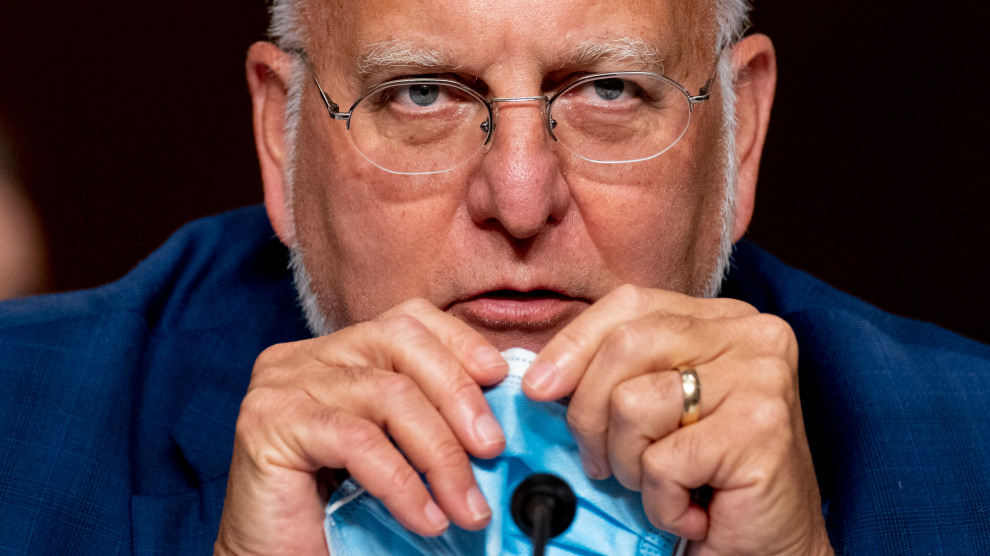The CDC Head Said Masks Are Better Than Vaccines. Here’s What He Meant.


Centers for Disease Control and Prevention Director Dr. Robert Redfield speaks at a Senate Appropriations subcommittee hearing on a “Review of Coronavirus Response Efforts” on Capitol Hill, Wednesday, Sept. 16, 2020, in Washington. AP Photo
Earlier today, Robert Redfield, head of the Centers for Disease Control, provoked the ire of some parts of the internet when he suggested that masks might be more effective than vaccines. “I might even go so far as to say that this face mask is more guaranteed to protect me against COVID than when I take a COVID vaccine,” Redford said while testifying before the Senate Subcommittee on Labor, Health and Human Services on expectations around the release of COVID-19 vaccines.
Redfield: masks are better than vaccines. pic.twitter.com/vyOB9UqDPj
— Alexander Nazaryan (@alexnazaryan) September 16, 2020
The statement is confusing, to put it mildly. Is Redfield trying to prepare us for a largely ineffective vaccine? Even worse: Is he intimating that we shouldn’t trust the vaccine because it’s being rushed for political reasons? Cue anti-vax groups: Any minute now, they’ll be seizing on Redford’s statement to validate their skepticism.
The delivery could have been clearer, but actually, Redfield is right. He’s referring to the fact that universal masking—when everyone in a group wears a mask—reliably and dramatically reduces transmission of coronavirus. By reducing the amount of virus individuals are exposed to, masks may also lessen the severity of the disease should they catch COVID-19. We don’t yet know how effective a vaccine will be, but it only needs to be 50 percent effective to gain approval from the FDA. Most experts expect that the vaccine will work slightly better than that, but not by much.
Which brings me to the most important point: It is overwhelmingly likely that the first COVID-19 vaccine will not be a silver bullet. Rather, it will be one more weapon against the disease to add to our arsenal. If you don’t like the battle analogy, you might prefer the public health concept of layering. It’s like getting dressed for a blizzard, where each intervention—in this case, masks, social distancing, and eventually a vaccine—will work in tandem to protect you.
This is an essential concept for everyone in the world to understand—because if we continue to think of the vaccine as a silver bullet, the results could be disastrous. Let’s say it’s next spring, and a group of family and friends all gets the vaccine just in time for an Easter gathering. Thinking they’re no longer at risk of spreading the virus, they go to church, where they sing and socialize, then enjoy a meal together at someone’s house—all without masks. If the vaccine is only 60 percent effective, this group unwittingly could be spreading the virus far and wide. It’s a little like sunscreen. For decades, dermatologists have noted that applying sunscreen makes people feel invincible to skin damage from the sun—which actually makes them more likely to engage in risky activities like sunbathing and less likely to use other methods of protecting themselves. Does that mean you shouldn’t wear sunscreen? No. It just means you should wear a hat and sit in the shade as well. (Check out this 1998 deep cut from Mother Jones on the sunscreen paradox!)
And as long as we’re talking about analogies, here’s another one: Writing in the New England Journal of Medicine last week, two University of California-San Francisco infectious disease specialists described the compelling concept of a mask as a “crude vaccine.” Intuitively, this makes sense. Just like a vaccine, the effectiveness of masks increases the more people who use them. Even more interestingly, the analogy goes further. Masks may expose people to just enough virus to create an immune response—an immunological concept, known as “variolation.” It’s the same one behind vaccines.
There’s another takeaway from Redfield’s comment. Unfortunately, it’s characteristic of the Trump administration’s disastrously inconsistent communication around coronavirus. During the same testimony, he also said that he expects we’ll have enough vaccine to return to “regular life” by the third quarter of next year. Many public health experts have noted the damage that’s been done by poor messaging from the government around coronavirus: more transmission, more deaths, and ultimately, an erosion of trust in public health. That’s a big shame, because here’s what else works a little like a vaccine: Consistent communication about how we can all work together, layer by layer, to protect ourselves.
*** This article has been archived for your research. The original version from Mother Jones can be found here ***


